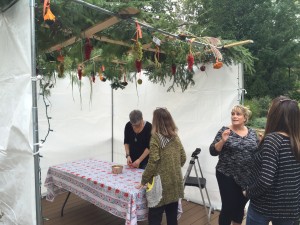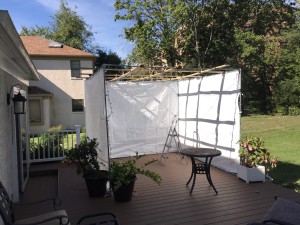We are about to read the story known as the Akedah, The Binding of Isaac. It is the story of Abraham hearing God’s command and taking his son on a journey to Mount Moriah, to offer Isaac as a sacrifice to the Eternal.
What does the Akedah really mean? And why do we read it now, on Rosh Hashanah? It is a hard text to comprehend. It is incongruous, it seems too sparse- so much of the story seems to be untold; the unspoken words in between the words on the page seem almost boundless. It is also a hard text as we grapple to find Jewish values in a narrative that does not seem to explicitly embrace them very well. It is a fascinating example of remembrance.
When we look back, it is interesting to see how we remember. Last year, all 365 days are compressed into some memories. We do not relive every moment. Instead we select highlights, and even those we filter and interpret. For anyone with a partner or spouse, we all have experienced a retelling of a story or event only to be interrupted by our partner with a different recollection of the same event. “No, it was Thursday— at 2 o’clock. And it was YOUR mother, not my father.” And even if you are single, we have all heard someone recall an event to which we think to ourselves, “that’s not how it happened at all.” Who we are affects and where we are in our lives affects what and how we remember. It is like that with the Akedah.
Each time we approach this story it is new. The words are familiar but we see things we had not seen before, often we see things for the first time. We have grown and we have experienced and we are not who we were the last time we encounter the story. And because of this, the story is new, revealing things to us we did not or could not see before.
There are stories and elucidations in our tradition that the rabbis told called Midrashim wherein they attempt to explain what is really happening in a particular biblical story, filling in the gaps that exist. The Akedah is a particularly fertile opportunity; the rabbis attempt to explain what is really going on here. Some Midrashim suggest that Isaac actually was sacrificed. One piece of evidence used to substantiate this understanding is that Abraham was instructed by God to sacrifice Isaac. The Angel telling Abraham to stop would not have swayed Abraham from following God’s instruction. It would be akin to a Lieutenant countermanding a General’s order. But ultimately God remains true to the promise and resurrects Isaac. This could account for why Abraham and Isaac ascend the mountain together, but Abraham descends the mountain alone.
Why would such an interpretation come about? Possibly it was in response to a time of great persecution when Jews were being martyred killed for their observance. We needed something to hold on to at a time of great hardship and trial. And it may have fallen into disuse as Christianity embraced the Akedah story as a foretelling of their theology.
And then at other times, the Akedah presents the saving of Isaac as the triumphal expression of God’s love and the prohibition of human sacrifice. Some of the greatest minds, both Jew and non-Jew, throughout history have argued almost every conceivable interpretation. We carry on an illustrious tradition by continuing to grapple with this text.
So for you here today, at this stage of your life what does the story of the Akedah mean to you? On Rosh Hashanah, this time of introspection, we are likened to Abraham. So as you reflect on your year gone by, how do you make meaning from your journey? What do you remember, what do you leave out? How do you make sense of your story as you listen to the story of Abraham and Isaac in the Akedah?


